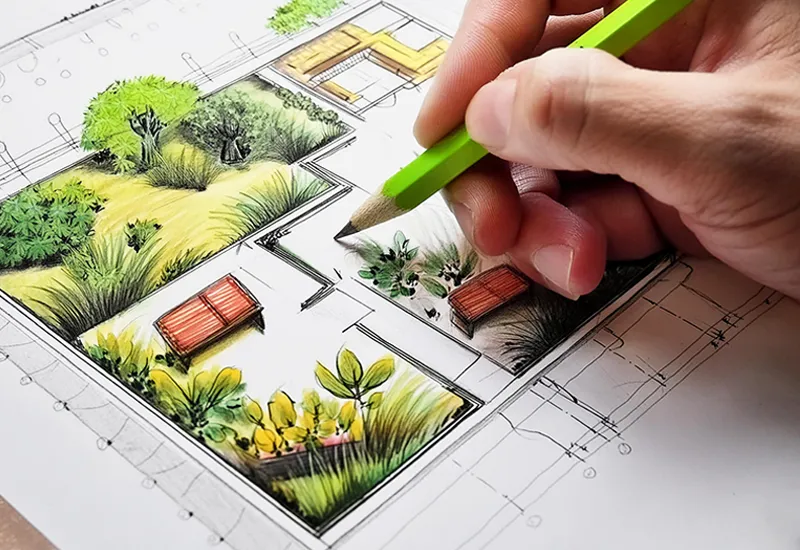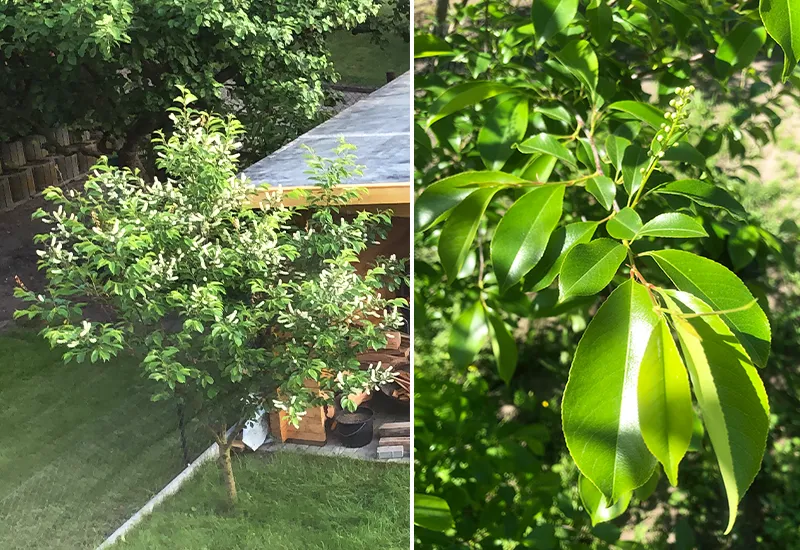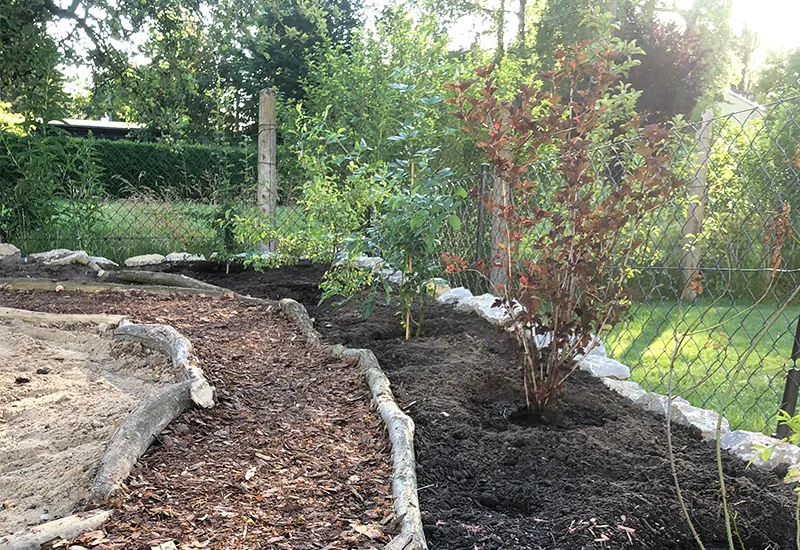Do you want to learn about the typical mistakes in the natural garden and avoid them straight away? Then you've come to the right place! Having your own garden offers you the great opportunity to Biodiversity right on your doorstep and at the same time create a space for your personal relaxation.
Unfortunately, mistakes or even omissions creep in time and again - usually out of ignorance - which harm plants and animals or set us hobby gardeners back massively in our gardening goals. But fortunately, we can learn from our mistakes!
In this article, I would therefore like to introduce you to the most common sources of error in the natural garden, which you can then avoid immediately when designing your garden and gardening in general. I'll also provide you with the corresponding alternatives. Let's go!
14 common mistakes in the natural garden that are easy to avoid
With a natural garden I am pursuing the goalinsects and other Help animals - and my contribution against the Species Extinction to achieve. I also want to create a lively place of well-being for myself, where I can listen to birdsong, the buzzing of bees and many other sounds. relaxing sounds of nature can enjoy.
Unfortunately, unnecessary errors only slow down this processas I found out for myself. I would therefore like to take this opportunity to tell you that it is great that you inform yourself in advance about common mistakes and blunders in the natural garden.
So avoid the following mistakes straight away - and use the tips to avoid them when planting your garden better from the start.
1. just get started without a plan

A lot of people just start to clear a bed here and plant a tree there without thinking. As a result the risk of making one mistake after another grows and later regret not having informed yourself better.
The garden is a lifelong projectthat should give you as much lasting pleasure as possible. A garden plan is therefore essential to stay motivated and have fun at all times.
Among other things, you should Garden paths, flower beds, shade, seating areas or also Site conditions draw in. And how do you want to use the garden? Do you have children or pets, for example? You should definitely answer these questions and put them together in a relatively clear plan before you create your natural garden.
2. want to ensure perfect order
Leaves raked away, straight bed borders, lots of gravel, few plants and a rolling robotic lawnmowerso that the desired "English lawn" remains nice and short. Many people dream of the perfect garden.
Thereby life in a natural garden benefits from a certain wildness and that you, as a hobby gardener, keep your hands and feet still from time to time 😉.
Rather create wild structureslet Piles of leaves lying around and only mow your lawn once in a while (see also Mowing-free May) with a manual cylinder mower or scythe. This allows dandelions and daisies, for example, to grow and delight the insect world.
3. focus only on the honey bee
Another common gardening mistake that many insect lovers make is to favor the honeybee. They are certainly the best-known bee, but they are neither threatened nor indigenous! It is the many Wild bee species that need our protectionbecause they have an irreplaceable function in nature and must not be allowed to die out.
Therefore, when choosing plants for your garden, you should Don't be dazzled by the "bee-friendly" labelbut rather check again which bees are really interested in the preferred plant. I always do this with the naturaDB App.
4. underestimate the amount of work involved
Whether a natural garden, cottage garden or rose garden - this mistake can of course happen with any garden shape. And the Natural gardens can really be very low-maintenancebecause you just let nature do its thing 😉.
However, it requires Initial efforts in planning and designwhich you should not underestimate. Therefore, plan realistically how much time and energy you can and want to invest in your garden in the near future. If in doubt, you can also simply start with a wild, natural corner in the garden start.
5. watering too much, too little or incorrectly
Every plant has its own individual needs - one plant always needs it moist and another has no problem with dryness. So find out in advance, as Overwatering and waterlogging can lead to root rot and Underwatering can lead to dehydration.
You should also only plant your garden plants early in the morning or late in the evening and Water less frequently but more heavilyso that the water actually reaches the roots and the soil is not only watered superficially. This allows long, strong roots to form.
Speaking of water! You can save money sustainably by installing a cistern or converting an old wine barrel into a rain barrel - or both! This way, you can use the collected, free rainwater for irrigation and don't always have to turn on the garden tap.
6. use artificial fertilizers and pesticides
Chemical fertilizers have just as little place in a natural garden as pesticides, herbicides and insecticides. They destroy nature, pollute soil and groundwater and kill animals.
However, since chemical pesticides in particular normally available in garden centers Many people trust that the products cannot be so questionable.
You should not make this natural garden mistake and instead rely on natural fertilizers and a Sustainable pest control put Mulch, weed, collect slugs and snails and put them in the meadow. And encourage ladybugs, for example, the natural Predators from aphids.
Tip: In fact, many of the so-called Weeds extremely insect-friendly. In the linked blog article, I'll explain which ones are included and why you can leave them alone.
7. install insect hotels from the DIY store
Commercial bee hotels are generally completely useless for the insects. The Tubes are too short, the drill holes directly in the end grain and pine cones and co. not used.
But no reproach to consumers and hobby gardeners! It is well meant and You can't know everything. I also assume that the nesting aids are built in such a way that they have an ecological benefit. Deceived.
It's best to build an insect hotel yourself (Here you can find tips from bee expert Dr. Paul Westrich) and also insert a Sandarium as most wild bees nest in the ground.
8. planting invasive neophytes

Speaking of which! A widespread misconception is that the plants in garden centers almost all native and environmentally and insect-friendly are. But the opposite is the case!
This is because most of the plants on offer have been introduced from foreign regions. These so-called neophytes may also look good, but they have often of no value to our native garden animals.
Some (e.g. common lilac, summer lilac or the laurel cherry) are even invasive, displace native plant species and destabilize entire ecosystems.
So right from the start Value on native plantssuch as the European service tree, the field maple, the thorny hawthorn, the bilberry or regional wildflowers.
9. sowing seeds and plants without a plan
For me, it is also a big mistake in the garden not to deal with the respective plant before sowing seeds. As a result usually hinders plant growth and completely ruin your own gardening work.
Therefore, find out in advance from the respective seeds about the ideal Sowing time, the Soil quality, the right Depth and the right Plant spacingthe ideal Location, the Water and sun requirementsand, if necessary, the ideal Harvest time.
10. disregard the planting location
A real mistake I once made myself was to simply plant the plants I had bought somewhere. That usually goes wrong!
So that you don't throw your money down the drain and promote your species-friendly natural gardenyou need to take a closer look at the location requirements of your plants, at least in the initial phase.
The Soil should always be loosened and not be hard and compacted. Does the plant need a lot of light and water? Does the soil need to be nutrient-poor, normal or nutrient-rich? These are questions that you should definitely answer in advance.
11. rely on unnecessary technology
A natural garden is also quite inexpensive because you don't need expensive equipment to maintain it. Robotic lawn mowers that keep the lawn short and noisy leaf vacuum cleaners are also the The opposite of what attracts garden animals. In my opinion, their purchase was a costly gardening mistake.
Natural gardeners rely on a few effective tools instead. Besides Shovel, spade, hoe, rake, garden knife, secateurs, a scythe and a saw you really don't need that many things anymore.
Good to know: Why Leaf blowers and leaf vacuum cleaners not sustainable and pollute the environment, I have summarized them in more detail in another article.
12. buy soil with peat from the garden center
Peaty soil is popular - but the Peat extraction in the raised bogs irretrievably destroys the habitat of many plants and animals. As moors are important CO2 reservoirs, even the Climate Change accelerated. Even peat-reduced or low-peat soil does not solve the problem.
So don't make the same mistake as me and buy Directly peat-free alternatives.
A peat-free soil is compost, for example. However, I can only advise you not to buy it pre-packed at the DIY store, but to use it directly with a trailer at the recycling center to get. You'll save a lot of money and you also avoid plastic waste.
13. cutting trees, hedges and shrubs at the wrong time
The ideal pruning time for most plants is in spring before budding. But whether it's lavender, wild roses, privet or hornbeam - not all plants should be pruned at the same time.
So take a close lookwhen the ideal time is for the respective garden plant. Then it can grow healthily and attract insects with its flowers.
This mistake is even illegal at the wrong time of year, as the Federal Nature Conservation Act prohibits the cutting of trees and shrubs from October up to and including February to protect nesting birds and other garden animals.
14. be impatient

Mother Nature takes her time. As soon as you have planted your garden, it's time to wait and see. So expect not instant perfectionbut enjoy the development of your garden and give your plants time to flourish.
Day by day, step by step - and perhaps with a few adjustments along the way - your colorful, vibrant dream garden will emerge.
Know and avoid typical natural garden mistakes!
Our gardens can be a mecca of biodiversity and our Environmental Awareness reflect. I very much hope that this list will help you to fulfill your dream of a unique natural garden even faster.
But be aware, that mistakes are human and that they cannot be completely avoided. So if you notice one, use the moment to learn from it and derive a better solution for the future.
"A person who never made a mistake never tried anything new."
Albert Einstein (more under Error quotes)
Do you have any questions, suggestions or your own experiences with gardening mistakes that you would like to share? Then I look forward to your comment!
Stay attentive and in touch with nature,

PS: Hardly any maintenance required, great cost savings, incredible biodiversity - a Natural garden has so many advantages! I'll be happy to show you the other reasons for natural gardens in the next blog article.






